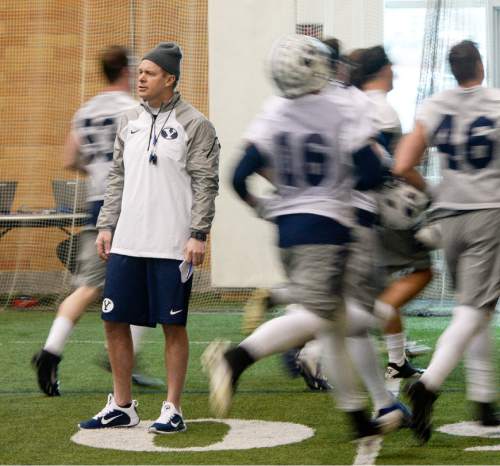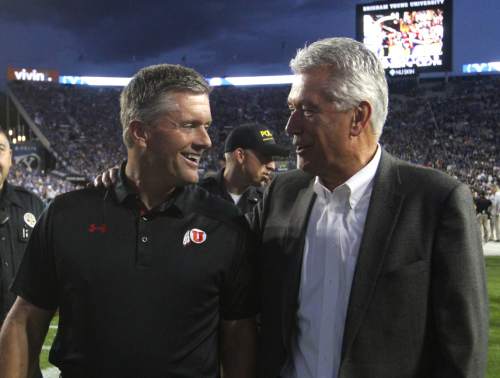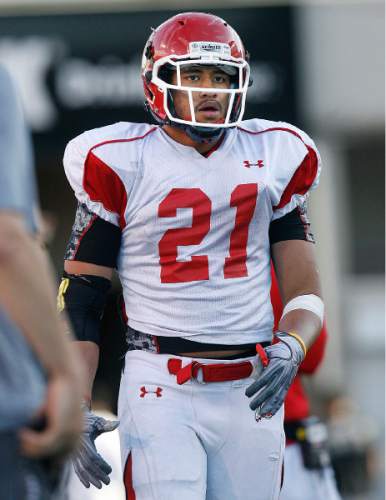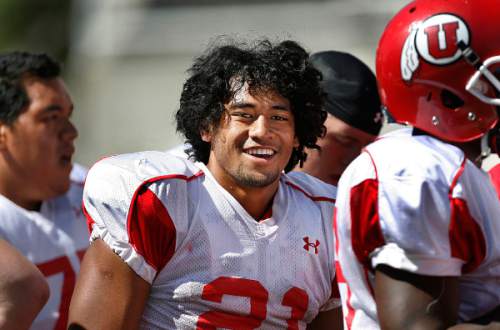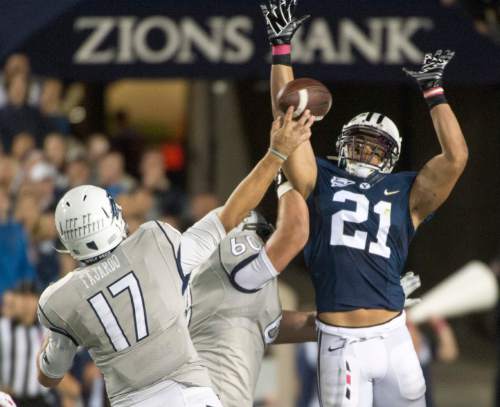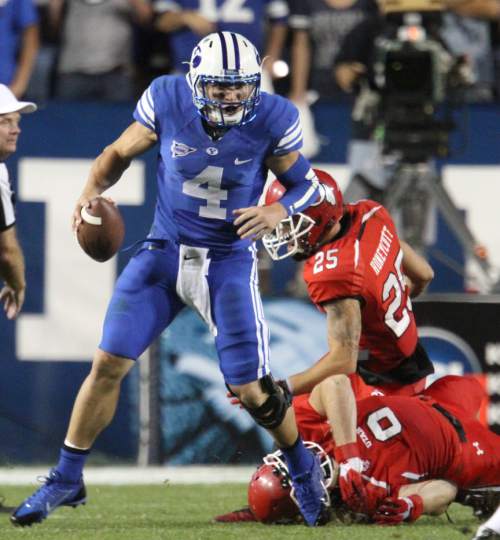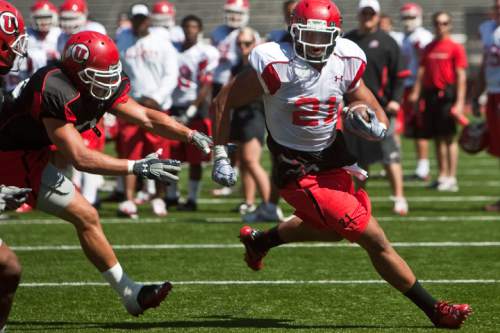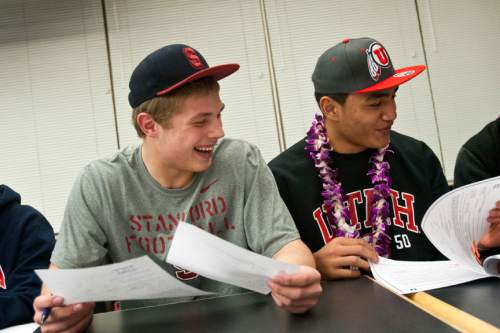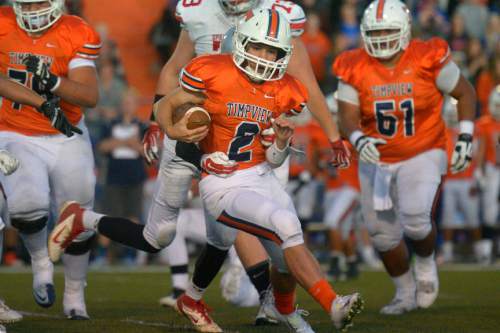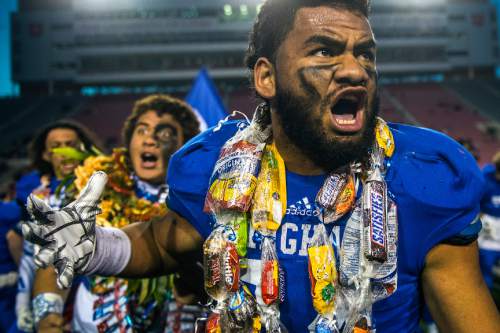This is an archived article that was published on sltrib.com in 2015, and information in the article may be outdated. It is provided only for personal research purposes and may not be reprinted.
Utah State didn't name it the Riley Nelson Rule. That was the media's doing. Still, Utah State and the Western Athletic Conference proposed it shortly after Logan High legend Riley Nelson decided he'd rather quarterback BYU than the hometown Aggies, so Riley Nelson's rule, it forever will be.
A refresher: Nelson played at USU as a true freshman in 2006, and on Memorial Day 2008, while serving an LDS mission in Barcelona, he announced he'd had a change of heart.
Nelson said he made the decision on his own; BYU had not recruited him. Others felt they knew better, and gave rise to NCAA Bylaw 13.1.1.3.2.1.
Many active LDS missionaries became off-limits to recruiters.
Yet by 2015, due to the LDS Church's lowering of the mission age to 18 and the NCAA's lowering of its initial scholarship limit to 25, that rule would hardly ever apply.
And the coach at Utah State during Nelson's subsequent BYU career is good with that.
"Quite honestly, I've never heard about a kid getting recruited while he's on his mission," said Gary Andersen, now the head coach at Oregon State. "I don't ever remember sitting in a staff meeting, saying, 'Oh my gosh, these guys are trying to steal our recruits while we're on our missions.'"
That's exactly what the rule was designed to prevent, however. What it says is that a player who signs a national letter of intent (NLI) and enrolls full time at a school may not be contacted during a church mission without that school's permission — an extension of the one-year limit that applies to other players who've signed an NLI or received aid.
It works both ways: Players can't contact schools. Schools can't contact players — or their parents.
But few missionaries now fit that profile. Many serve before enrolling. Schools are now more sparing with their NLIs and initial scholarships. And even those who play before serving are increasingly likely to enroll early in January and thus never sign an NLI on February's National Signing Day, as happened in Harvey Langi's eye-opening transfer from Utah to BYU last summer.
Applications of the Riley Nelson Rule are going to be "fewer and fewer," said Utah head coach Kyle Whittingham. "If you go out on a mission first, then, essentially, when you get back, you're a free agent."
In fact, that's the case a year before most LDS missionaries return.
Whittingham, Andersen and Bronco Mendenhall all say they'd never contact a missionary who had enrolled or signed an NLI with another school. Regardless of NCAA rules, they say, they respect a young man's privacy while he serves his church.
Evidence, either way, is hard to come by.
You'd have to take them on faith.
Perception or reality? • In Benin and Togo — on your map, two screws drilled side-by-side into the heart of the southern West African coastline — Sean Barton served each day until dawn.
He'd work out when he got home: In Benin, he improvised weights by filling powdered milk containers with cement and stringing them from a bar; and in Togo, he found a local strongman who built him a custom set, complete with a wooden bench, for about $60.
Serve, lift, eat. And then bed.
There, his only salvation from the 95-degree swelter was a portable fan. Most days, the power went out. Then there was no hope of sleep. Just sweat.
He was halfway around the world without the comforts of home, his mother tongue and friends and family. Barton summarizes the experience thusly, without irony: "It was awesome."
Meanwhile, his father, Carl Barton, was receiving queries from Division I teams, some of whom sought contact info for the four-star linebacker. Barton signed an NLI at Stanford in 2013 but never enrolled, meaning schools only needed to wait one year to reach out to him.
A handful didn't even wait that long, Carl Barton said. He declined to name names, but he said it wasn't merely associates of the schools, or his son's peers. "We're talking coaches."
It's the kind of story that terrifies fans at Utah schools and the few others, like Stanford and Oregon State, that target prospective missionaries without trying to dissuade them from service.
Utah State compliance director Jake Garlock, who helped create the Riley Nelson Rule, said it's mostly "just rumor" that schools recruit other teams' missionaries. Hard facts are hard to come by. "But there's always that fear in the back of your head. I think every coach in Utah has that insecurity."
Mendenhall said in 2009 he welcomed the Riley Nelson Rule as the coach of the school with the most LDS missionaries. Some fans and coaches, who believe Mendenhall's program tries to lure missionaries while they're isolated and receptive to the notion of a church-associated education, have scoffed at that.
Hawaii coach Norm Chow notably blocked the transfer of safety Michael Wadsworth in 2012 after learning that BYU had requested contact with Wadsworth. Chow declined comment then and now, but Wadsworth's father, John, told The Tribune last year that Chow said "BYU was 'poaching.' He kept referring to the Riley Nelson case."
Tampa Mission President Mark Cusick formally started the Langi saga by reaching out to BYU on Langi's behalf, leading some to question whether that was a mission president's role (a church spokesman said it was in keeping with his responsibility to help ease the post-mission transition) and whether Cusick's background as the parent of a former BYU walk-on receiver led him to meddle.
Such stories don't move Andersen. "I've heard this whole song and dance a thousand times when I was at Utah and I was at Utah State. Yeah, he's a mission president. If he likes BYU and he talks to a kid about BYU, does that mean he's recruiting him? I don't think so."
It bears noting that only a handful of high-profile players have recently transferred after their missions, and it hasn't always worked in BYU's favor. Jake Murphy switched from the Y. to the U., and the nation's former No. 1 recruit, quarterback Ben Olson, transferred post-mission to UCLA.
Asked about the perception that BYU "poaches" players, Mendenhall wrote: "Young men who chose to serve a mission have far better things to do than worry about football while in the mission field. It would be a disservice to both the missionary and their family to distract them in any way. Regardless of what happens, or what others perceive, the interest of the missionary is always the primary concern."
No change afoot • In the rare cases that the Riley Nelson Rule does still apply, it's nearly impossible to police.
The parents of one in-state athlete who meets the requirements say they've been contacted by people associated with another school, gauging their son's interest. There's no way to tell whether that effort is being coordinated by the school's staff, though.
Still, "my guess is coaches in general, whether they be at BYU or Utah State or Weber, whatever, they like the restrictions that are in place because it helps protect [their athletes]," said Utah compliance director Kate Charipar.
It would have been a huge inconvenience for BYU, for example, to lose Tanner Mangum. BYU plans its scholarships using a seven-year timeline, and coaches recruited quarterbacks in the past two seasons with the expectation that Mangum, a former Elite 11 MVP who signed an NLI and enrolled, would come back after two years in Chile.
The scenarios can get complicated, but that works in the favor of the schools that most often deal with missionaries. The U.'s compliance office declined to provide The Tribune with a chart they made for Whittingham because they consider it a competitive advantage.
And yet Garlock, the guy you might call the father of the Riley Nelson Rule, said there's no push to have the rule tweaked so it applies more broadly. That would require separate legislative processes with the NCAA and NLI, he said, and NCAA rules changes are harder now to come by.
Andersen and Mendenhall are content. Wrote Mendenhall: "The rules, as presently constituted, are effective in protecting the interests of both the student-athlete and the institution that recruited him."
Others, like New York Jets outside linebacker Trevor Reilly, think the Riley Nelson Rule should be scrapped altogether. It creates a barrier for missionaries that others don't have, he said.
"What does it matter, why you sit out?" said Reilly, who decided after his mission to attend Utah because Texas Tech head coach Mike Leach was in a contract dispute.
"I said I'm not going out to Lubbock, Texas, and getting stuck out there for five years without the guy who brought me in."
Existing rule, more rules or no rule, the best protection for coaches is to be both wary and respectful.
Carl Barton appreciates that Stanford was hands-off during his son's mission. They let him breathe. But they didn't forget about him. So prized was Sean Barton that this February, just a few months before he was due back in Woods Cross, Stanford's coaches asked him to protect their interests by signing a second NLI.
And so he set out into a dense West African slum, to find a fax machine.
mpiper@sltrib.com Twitter: @matthew_piper —
The Riley Nelson Rule (or Bylaw 13.1.1.3.2.1)
An institution shall not contact a student-athlete who has begun service on an official religious mission without obtaining permission from the institution from which the student-athlete withdrew prior to beginning his or her mission if the student-athlete signed a National Letter of Intent (NLI) and attended the institution (with which he or she signed the NLI) as a full-time student. If such a student-athlete has completed his or her official religious mission and does not enroll full time in a collegiate institution within one calendar year of completion of the mission, an institution may contact the student athlete without obtaining permission from the first institution.


